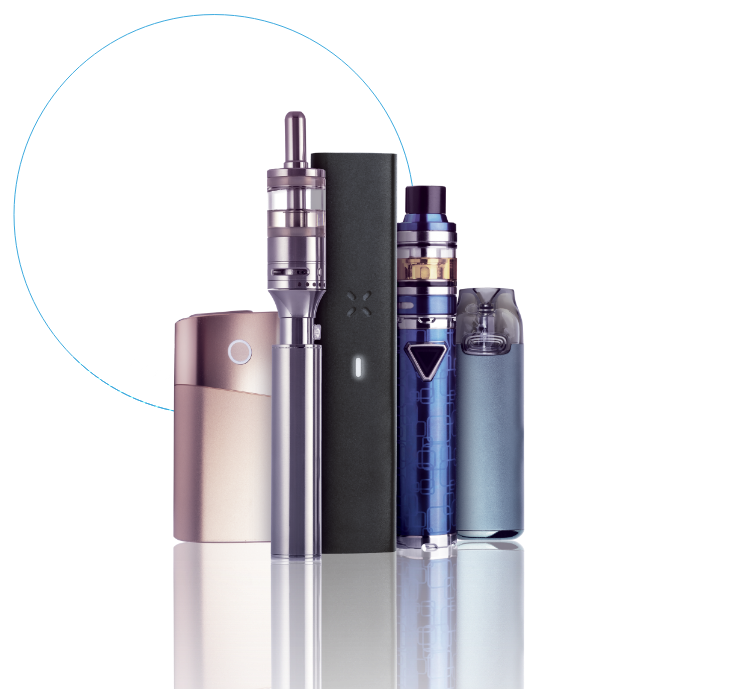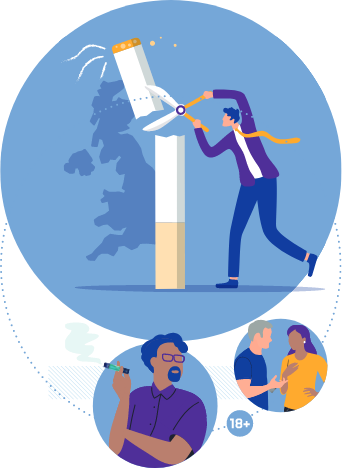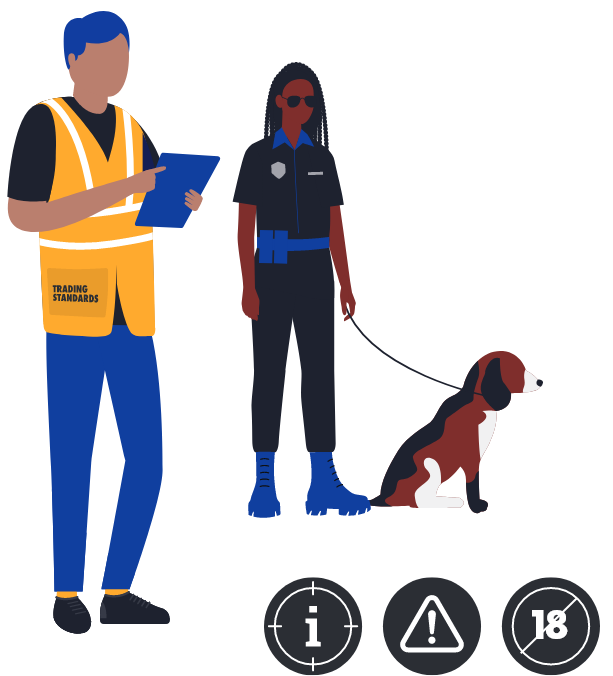The Future of UK Vape Regulation
Policies for the 21st Century


A Smokefree 2030
The UK is one of the world’s leading countries in reducing smoking rates. In 2022, levels fell to 12.9%1 - the lowest on record for the UK. Imperial Brands advocates proportionate, effective, and evidence-based regulation in support of a ‘Smokefree 2030’ objective of reducing smoking prevalence to <5%.
The rise in adult smokers using vapes as a cessation tool has been a crucial part of the UK’s success in reducing smoking rates. According to the Chief Medical Officer Sir Chris Whitty, each year, between 50,000 and 70,000 adults, or 17% of adult smokers, use vapes to help them quit smoking.2 This is why the NHS recognises vaping as one of the most effective tools for quitting cigarettes.3
Without exception, Imperial Brands believes that vapes should only be accessible to adults. We take a zero-tolerance approach to youth access to our blu devices, and our products, packaging and marketing make this clear. Our company has long called for stronger regulation to prevent youth vaping.
However, it is illogical to ban a generation from smoking, and at the same time, remove a convenient, affordable, and widely used alternative for adult smokers looking to take the first step towards quitting. If the UK is to continue its path to reducing smoking, a balance must be struck between raising standards across the vaping industry, and protecting the choices of adult consumers.

Fact Check:
Tackling misconceptions around nicotine and vaping
Newspapers and websites are brimming with scientific analysis and advice. Yet reporting of some studies, including on nicotine, Next Generation Products (NGPs), and vapes, can miss the mark.
As noted by Deborah Arnott, Chief Executive of Action on Smoking and Health UK, “scare stories” about young people vaping could be causing the growing misconception among adult smokers that vaping is as risky as smoking. This has significant public health impacts, as millions of smokers may “never try the most effective and easily available quitting aid, the e-cigarette.”1
With vaping regulation in focus, it is crucial that policymakers, adult smokers, and vape users themselves can debunk some of the biggest myths surrounding the products.

Vapes are just as bad for your health as cigarettes
Public health experts worldwide have concluded that the highest risks from smoking are from burning tobacco and inhaling the smoke. Compliant vapes do not contain tobacco, and do not produce smoke. As is recognised by the NHS, “most of the harmful chemicals in tobacco smoke, including tar and carbon monoxide, are not contained in vape aerosol.

Nicotine causes cancer
Researchers have concluded that it is the toxicants in cigarette smoke generated by burning tobacco, and not the nicotine, which cause smoking-related diseases. To date, nicotine has not been established to cause, by itself, cardiovascular disease or cancer. Many vape products contain nicotine, but importantly, tobacco-free products do not have to burn tobacco to deliver it to users. This means nicotine can be consumed in potentially less harmful ways.

Vapes pollute indoor environments like smoking
Unlike cigarettes, vapes do not produce ‘side-stream’ emissions, with any exhaled aerosol quickly evaporating. Peer-reviewed scientific research shows that vaping does not negatively impact indoor air quality. For instance, a room where a vaping device was used for almost three hours still comfortably fell within acceptable air quality boundaries. Recorded emissions were also notably lower than those from, for instance, a burning scented candle. Cancer Research UK has also concluded that there is “no good evidence that second-hand vapour from e-cigarettes is harmful”.6

There’s been hardly any scientific research around vapes
Over 10,000 scientific studies have been published on vapes since 2010. The overwhelming majority of this research supports the harm reduction potential of vaping. The growing body of scientific data is combined with the significant drops in smoking rates in countries who have embraced tobacco harm reduction. This includes the UK and Sweden, as well as Japan (which leverages heated tobacco products).

Vapes are unregulated
Though more can be done to reduce youth access, in the UK vaping is already highly regulated. All vape manufacturers must notify the Medicines Healthcare Products Regulatory Agency before products are launched. Likewise, the UK Tobacco and Related Products Regulations (TRPR) have imposed limits on nicotine concentrations, as well as strict product format, labelling and advertising guidelines.
The only unregulated vapes are those which are illegal. However, the failure to properly fund enforcement activities has led to a rise in illicit vaping devices. Currently, a third of vape products sold in UK shops are now thought to be illegal.7

Vapes can’t be recycled
Vapes can be recycled after they are dismantled at a recycling facility. Current Waste Electrical and Electronic Equipment Regulations require all producers to offer a ‘take-back’ solution to consumers to help ensure products are disposed of correctly. Our vaping brand, blu, offers this solution, but many other brands do not comply with this requirement.

Challenges facing vaping products
Tackling youth vaping while supporting smokers to quit
The NHS is clear8 that vaping is a powerful tool to help smokers transition away from combustible tobacco. In 2022, the Government’s Office for Health Improvement and Disparities found that vaping products “remain the most common aid used by people to help them stop smoking”.9 This study also found that vapes are the most successful way to quit, with an almost 65% success rate.
This is why the Chief Medical Officer Sir Chris Whitty stated that “if you smoke, vaping is much safer.”10
While tackling the crucial issue of youth vaping, we must ensure access is not limited for current adult smokers and ex-smokers. Imperial Brands has long called for stronger regulations, and stricter enforcement of existing ones. This includes…
…Vape Branding & Marketing
Stricter rules on flavour names - Flavour names that appeal to under-18s - such as ‘Cotton Candy’ and ‘Gummy Bear’ - are unacceptable and should be banned. However, according to the Royal College of Physicians, when marketed responsibly, flavours themselves are an “integral part” of the effectiveness of vapes as a harm reduction tool.11 Furthermore, the 2024 Action on Smoking and Health (ASH) survey of adult vapers found that fruit flavours are by far the most popular choice for adults.12
Limiting vape flavours, including a move to tobacco-flavour only, was considered in the Department for Health’s creating a smokefree generation and tackling youth vaping consultation (2023).13 However, if this becomes the law, many ex-smokers currently using vapes may return to the real thing. A survey in Canada has shown that 36% of vapers have returned to smoking cigarettes because of the Quebec vape flavour ban in 2023.14 A separate study also found that vape flavour bans have the unintended consequence of moving younger consumers onto combustible cigarettes.15
The right to package vapes differently to cigarettes - Introducing plain packaging for vape risks reinforcing the misconception that vape is equally as harmful as smoking. A long-term study funded by Cancer Research UK found that 57% of smokers believed vapes were equally - or even more harmful - than cigarettes.16 In 2024 Action on Smoking and Health puts this figure at 60%, noting that it is the highest ever proportion of consumers with this misconception, and a significant increase from the previous year.17
Vape Advertising & Promotion
Imperial Brands believes adult consumers deserve access to informative, educational, and scientifically proven information about the products available to them. Marketing and advertising channels are essential for adult consumers to be made aware of potentially reduced risk alternatives and aid in their transition to Next Generation Product categories, such as vape.
We market and sell our products responsibly, always adhering to regulations wherever we do business. We have a duty towards our adult consumers and are committed to the marketing, advertising, and sales of our products within the relevant local laws, codes of practice and voluntary agreements. We have a clear International Marketing Standard for NGPs that ensures that our vapes are only marketed to existing adult smokers and nicotine users, and we campaign for similar standards across the industry.

Vape Pricing
Introducing a volume-based duty for vapes - Imperial Brands welcomed the announcement of excise duty on vapes at the 2024 Spring Budget, as excise requires greater pre-notification due diligence and post-market surveillance. This is set to come into force in 2026. However, we believe the proposal should be brought forward to 2025, and have its proceeds ring fenced to support Trading Standards. This would reflect the urgent need for better enforcement. Additionally, unlike the models used by EU Member States with an excise duty on vapes, the planned model for the UK duty is set to be tiered and variable based on concentration. This is an unnecessary complication.
Access to Vapes
Ensuring adults can access disposable devices - According to Action on Smoking and Health, more than a third of adults using vapes are using disposable devices,18 as they are a convenient, affordable option for adult smokers looking to make the first step in quitting. A University of East Anglia study found that an outright ban on disposable vapes could create a gateway for vaping back to smoking, or from consuming compliant vapes to illicit vapes.19 Consumer polling by Yonder for the Scottish Grocers’ Federation supports this, indicating that 24% of existing disposable vapers will continue to source disposable vapes after the ban comes into effect.
Alongside worsening the already burgeoning illicit market, an outright ban on disposable vapes would also have an impact on falling smoking rates. Cancer Research UK has warned that the ban could have “unintended consequences”, particularly for people who smoke that are using them to quit.20
As a responsible manufacturer we fully understand the environmental concerns about disposable vapes, and work hard to address this in our portfolio, through consumer-centric, sustainable innovation. In 2024 we brought to market a fully compliant single-use vape, the blu bar 1000. This device has a removable battery, making it easier to safely dispose of according to regulations. We also advise our consumers that disposable vapes should be taken directly - or indirectly through our free take-back scheme - to local waste collection centres, where they can be safely processed.
Better online age verification - 13% of vapes sold illegally to 11-17 year olds who vape are purchased online.21 Websites should be age-gated, as well as operating age verification checks during each transaction. Imperial Brands’ vaping website, blu.com, already practises this, but it should be standard practice for all online retailers. Measures to stop underaged online sales were notably absent from the former Government’s Tobacco and Vapes Bill. This rising trend must be addressed in this Parliament.
Regulation of non-nicotine vapes - We strongly support equalising the regulations for non-nicotine vapes - products designed to circumvent regulation (such as “shortfills”). The absence of such regulation has led to an increase in nicotine-free products. The Government must urgently close this dangerous gap by including the term “non-nicotine containing e-liquid” in UK vaping regulations.

Stopping irresponsible actors creating a vape wild west
Raising Standards
Currently, irresponsible vape manufacturers and distributors are creating a vape “wild west” across the UK. The Government must clamp down on regulation-bending devices, through:
Tighter definitions of ‘single-use’ vapes - Since the announcement in January 2024 of the UK-wide proposal to ban disposable vapes, some manufacturers have begun releasing high puff count vapes, sometimes known as “carousel” or “click-on” vape devices. These vapes can carry up to six times more e-liquid than standard disposables and are reportedly intended to get around the incoming disposables ban with superficial recharging and refilling features.22 Although the batteries in these devices can be recharged through a USB port, the vapes still use non-replaceable mesh coils like traditional disposables.
Once the coil is “burnt out” the device must be disposed of in the same manner as a single-use vape. A more explicit mention of high puff count vapes in the draft regulations is therefore necessary to prevent irresponsible actors circumventing regulations.
Devices should have a single pod/tank that conforms to the 2ml limit, in addition to the separate refill container (no more than 10ml) which must be sold separately and should not be sold in the form of a click-on tank. Further vape product testing - Illicit vapes with illegal levels of nicotine content, and other ingredients like nickel and lead which are non-compliant, should play no role in helping adult smokers to quit. Imperial Brands would like the current testing regime to go further. This should include testing of products before they come to market, as well as further post-market testing and surveillance. This must be part of a wider push to increase the product quality and safety standards across the industry to reassure adult consumers.

ENFORCEMENT: Navigating current and future challenges
Nicotine containing vapes are already age restricted, but these restrictions are not enforced properly. No proposals designed to restrict youth access to vapes - or a proposal to change the age of sale for tobacco - will be possible without better enforcement.
The pressures on Trading Standards are well documented, with many local councils having limited resources to oversee everything from counterfeit clothing and personal goods to fake lottery tickets and scratch cards, in addition to illicit tobacco and vapes. The expected increase in illicit trade resulting from punitive restrictions on vapes and bans on disposable devices will only increase the workload of Trading Standards officers. As a British Medical Association (BMA) report notes, “increased and adequate”24 resources must be given to Trading Standards to support efforts to combat the illegal sale of vapes.

Case Study: The Impact of Vape Prohibition in Australia
In 2021, Australia introduced legislation that made it illegal to sell nicotine vapes to anyone without a prescription and, at the start of 2024, implemented further restrictions that outlawed the importation of disposable vapes and limited vape flavours.
The Australian government’s measures have proved ineffective at curbing youth vaping. Roughly 30 percent of 12-17-year-olds have tried e-cigarettes despite the restrictions. Furthermore smoking rates among 14-17 year olds has increased to 12.8%, while adult adult smoking rate declines have stagnated (11.2% in 2020 to 11.8% in 2023).25 The ban has also led to a steep rise in the illicit vape trade leading to the creation of a vape “wild west”:
- Vapes are now the second-largest illegal market in the country, after cannabis. In Victoria alone, authorities estimate the illicit vape market could be worth up to $500 million.26
- Reports have suggested that more than 90 percent of vapes used in Australia are acquired from the illicit market, with fewer than 10 percent of vapers having a prescription.27
- An estimated 120 million disposable vapes are imported illegally from China into Australia each year, mostly by criminal gangs.28 Australia’s Department of Home Affairs published documents at the start of the year that revealed that the number and value of vape seizures have surged across the country since tighter restrictions were introduced.29
To ensure a similar situation does not occur in the UK, Imperial Brands is urging the Government to consider:
- Introducing a Vape Retailer Licensing Scheme - 48% of under-18s who access vaping products do so through a retailer.30 Despite requirements for retailers to verify a customer’s age, some flout these regulations. Introducing a retailer licensing scheme would mean that any retailer selling nicotine products would need a licence to do so, adhere to a strict framework, and risk having their licence revoked if they fail to comply. Such a scheme would go a long way to tackling the sale of vapes to under-18s, as well as the sale of illicit vapes.
- In Scotland, a retailer registration scheme was implemented successfully in 2017, and the Welsh Government has said it will consider the introduction of one under existing legislation.31 A UK-wide scheme should therefore be considered, as a common-sense alternative to restrictions on point-of-sale displays.
- Introducing vape excise in 2025 - The Government should bring forward the introduction of vape excise duty to 2025, to reflect the urgent need for better enforcement and accountability across the sector. Delaying the introduction of the duty to 2026 will worsen the current situation, as a duty would enable the movement of legal vapes across the UK to be tracked through a scheme similar to the current UK Tobacco Track and Trace system.
- Increasing fines for those breaking the rules - The previous Conservative Government proposed fixed penalty notices of just £100 (or £50 if paid within two weeks) for retailers caught selling age-restricted products to under-18s.32 As called for by the British Medical Association, the Labour Government must ensure these fines are much larger, to provide a significant deterrent to irresponsible retailers.33 In France, the fine for distributing illegal vapes is set to increase to as high as €100,000.34

Planning for the ‘Smokefree’ generation
Countries from New Zealand and Australia, to Malaysia and Bhutan, have failed to introduce a ‘generational’ ban on the sale of tobacco. Though we support the UK in its ambition to be a world leader in public health, Rishi Sunak’s plan to ban the sale of tobacco products to those born before 1 January 2009 was based on limited evidence.
Our preferred model to further reduce smoking rates would be to permanently raise the age of sale from 18 to 21. As most smokers take up the habit before age 20, it would still support the UK’s ambition to eradicate smoking for the next generation. This has proven successful in the U.S., where smoking rates dropped by 39% when the measure was adopted in several U.S. states.35 The policy is now also being replicated in other countries, including the Republic of Ireland36 and Indonesia.37
As a responsible business, we respect the Labour Government’s election manifesto commitment to pressing ahead with its predecessor’s plans. But when legislating for a Smokefree Generation, we urge policymakers to plan for and mitigate the unintended consequences of prohibition. This ranges from increased illicit trade - which is already booming in the UK - and lost Treasury revenue from excise duty, to the impact of the ban on small retailers enforcing it on a daily basis, who are already struggling with rising violence towards shop staff.

Conclusion: Why Labour must Follow the Evidence, Not Copy Past Mistakes
A decade ago, when smoking prevalence in the UK was almost double what it is now, the possibility of a ‘Smokefree Generation’ in the near future seemed impossible. This ambition is now a reality, which is in no small part down to the popularity of vapes among smokers attempting to quit.
Illegal, youth vaping is tarnishing the UK’s world-leading progress in reducing smoking prevalence. But the fault for this does not lie with the responsible manufacturers who sell legal vaping products, or the many hardworking retailers who stick to the rules. The rise in youth vaping is the result of years of underfunding of enforcement agencies, barely enforced rules on branding and marketing to under-18s, and an influx of non-compliant illicit vapes from China.
The Labour Government has urgent choices to make.
Will it opt for evidence-based policymaking, and harness the public health potential of vapes? Or, will it continue to pursue its predecessor’s quixotic legacy policy, despite growing evidence of its failure abroad?
Do ministers want to be on the side of responsible businesses who make and sell compliant, reduced-harm products to adults and adults only?
Or does it want to be on the side of the criminals and rogue actors who sell illicit products - who will be emboldened if policymakers fail to change course?
Imperial Brands strongly urges the Government to choose the former, by reconsidering the measures contained within the resurrected Tobacco and Vapes Bill, before its many unintended and destructive consequences take root.

Introducing Imperial Brands PLC
- Imperial Brands PLC (IMB) is a FTSE 100 business headquartered in Bristol and parent company of a dynamic international business specialising in tobacco and non-tobacco brands. We have made a significant investment in our UK business and a material contribution to the country’s economy and workforce.
- Alongside our core tobacco brands, our commercial focus encompasses our Next Generation Product (NGP) portfolio, including our brand blu, a market pioneer in the UK vaping category. These NGPs offer alternative choices for those adult smokers who are looking to transition to a potentially reduced harm alternative.

This pamphlet outlines Imperial Brands’ recommendations on how the vaping category can be more effectively regulated, as the UK works towards its Smokefree 2030 goal. It addresses the concerns and misconceptions expressed by the public and policymakers, and is designed to inform stakeholders of the benefits - and risks - of the proposals under consideration by the Government.
Our engagement: Article 5.3 of the FCTC
- The UK is a signatory to the WHO’s Framework Convention on Tobacco Control (FCTC) treaty. Article 5.3 of the FCTC seeks to ensure that interactions between the tobacco industry and policymakers are “conducted transparently”. The FCTC does not apply to interactions between the vaping industry and policymakers regarding vape regulation.
- Imperial Brands is fully committed to all industry-Government interactions being transparent and accurate. The FCTC, a subsequent European Court of Justice ruling, and the UK Government’s own guidance on Article 5.3, do not warrant the exclusion of legitimate stakeholders from opportunities to contribute to and consult on relevant regulations. Article 5.3 also does not preclude policymakers - elected or unelected - from engaging with the tobacco industry or associated parties. An open dialogue is crucial to help policymakers make objective recommendations, particularly on matters unrelated to public health.
